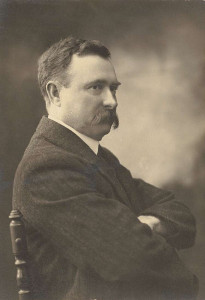[Editor: This article provides biographical information about Edwin Greenslade Murphy (“Dryblower”); for various works by him, click here.]

Murphy was born in Castlemaine, Victoria, on 12 December 1866. He moved to Western Australia to search for gold. He did some prospecting, including with the dryblowing method (using the wind to help sift gold from dirt). He was involved at the start of the Coolgardie Miner newspaper, where he took up the pseudonym “Dryblower”, a pen-name which he used for the rest of his life.
In 1895 he went to England to seek financial backing for a WA mine, but the venture failed. After a short trip back to Australia, he returned to London, where married Emma Eleanor Lowndes, and worked for several newspapers.
After his return to Australia in 1899 he worked as a writer for the Sun in Kalgoorlie, a weekly newspaper. In April 1901 he changed over to The West Australian Sunday Times in Perth (another weekly newspaper, which later shortened its title to become The Sunday Times), which (apart from a year he spent on running his own short-lived newspaper, Sporting Life) he wrote for until December 1938 (his last piece was published on 1 January 1939).
He ran as an independent candidate for the WA Senate in the 1934 federal election, but did not win a seat. His campaigning was rather lackluster, as he did not raise a campaign committee and apparently did not even issue a list of policies which he wished to pursue, instead advising the public that “I am content to let you judge my political fitness by my newspaper work in the past . . . I am asking you to believe in me politically because you have believed in me poetically”.[1]
Murphy was a prolific and popular writer; it has been estimated that he may have written about 10,000 poems, which would be a phenomenal output.[2] He has been described as “Western Australia’s own C.J. Dennis”.[3]
“Dryblower” Murphy died from cancer in East Perth, WA, on 9 March 1939.
Books and other works by “Dryblower” Murphy:
Works of Edwin Greenslade Murphy (“Dryblower”)
Works about “Dryblower” Murphy:
[Arranged by date.]
Interview with a returned Westralian: Interesting chat with Mr. E. G. Murphy [17 September 1899]
An interview with “Dryblower” Murphy, following his return from England.
A poet comes to judgment: Dryblower’s candidature (Mr. E. Greenslade Murphy), [7 September 1934]
Article by E. L. Handcock about the Senate candidature of “Dryblower” Murphy.
“Dryblower” [9 March 1939]
A poem by Jack Sorensen, published just after the death of “Dryblower” Murphy.
References and further reading:
Arthur L. Bennett, “Murphy, Edwin Greenslade (Dryblower) (1866–1939)”, Australian Dictionary of Biography, National Centre of Biography, Australian National University (accessed 21 January 2013)
“Edwin Greenslade Murphy”, Wikipedia (accessed 21 January 2013)
[1] “For the Senate: “Dryblower” Murphy’s campaign: Opening broadcast address ”, The Sunday Times (Perth, WA), 2 September 1934, p. 26
“Candidates of the Australian federal election, 1934”, Wikipedia (accessed 21 January 2013)
[2] “Edwin Greenslade (Dryblower) Murphy”, Western Australia Bush Poets and Yarn Spinners Association (accessed 21 January 2013; URL updated 25 November 2016)
[3] Peter Stanley, Digger Smith and Australia’s Great War: Ordinary Name — Extraordinary Stories, Millers Point (NSW): Pier 9, 2011, [page 15 (unnumbered), chapter 1] (accessed 21 January 2013)
Link to wabushpoets in references is broken – correct link is:
http://www.wabushpoets.asn.au/pastpoets/Murphy/murphy.html
Thank you.
The URL has now been updated.